英语形容词副词比较级最高级
英语形容词和副词的比较级和最高级
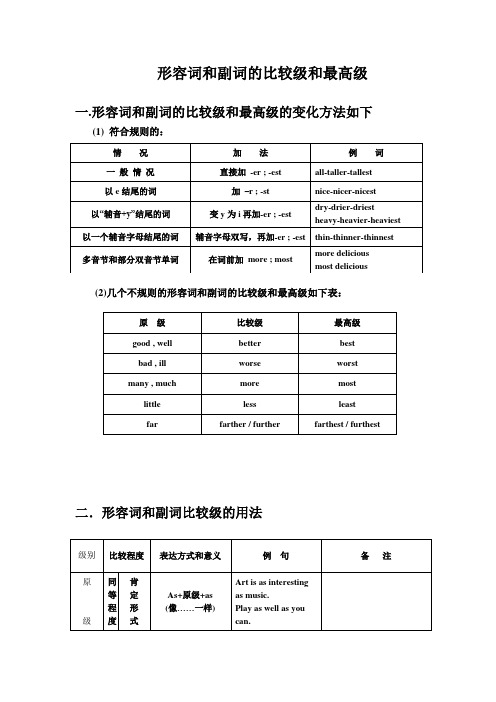
形容词和副词的比较级和最高级一.形容词和副词的比较级和最高级的变化方法如下(1) 符合规则的:(2)几个不规则的形容词和副词的比较级和最高级如下表:二.形容词和副词比较级的用法注意:有些形容词,如 dead, empty, round, sure, woolen 等受本身含义的限制,没有比较级。
例题解析1. He is ________ friends than I.A. much moreB. many moreC. very moreD. too more解析:后面有可数名词复数时,many的比较级形式为many more 修饰。
应选B.2. Which is the _________ country, Japan or Australia?A. more developedB. more developingC. most developedD. most developing解析:两者比较用比较级,表示"发达"用developed, 而developing 是"发展中的" 意思3. There were _______ shops in the city in 1982 than in 1990.A. littleB. fewC. fewerD. less解析:little 不能修饰可数名词,两者比较需用比较级,所以应选C.4. If you are not free today, come another day __________.A. tooB. soC. insteadD. yet解析:instead 作副词用时意为"代替,顶替",表示前面的事情没做,而是做了后面的事。
Instead一般位于句首。
应选C.5.He can't tell us ________, I think.A. important anythingB. anything importantC. important somethingD. something important.解析:不定代词与形容词联用需后置,否定句中应该用anything而不是something. 因此应选B6. The Huang River is the second __________ river in our country.A. longB. longerC. longestD. the longest解析:"定冠词the+ 序数词+ 形容词最高级" 表示"第几大……" 应选C.7. The light in the office wasn't ________for him to read.A. enough brightB. bright enoughC. brightlyD. enough brightly解析:enough修饰名词时可前可后,修饰形容词或副词时,要后置。
英语中形容词副词的比较级和最高级
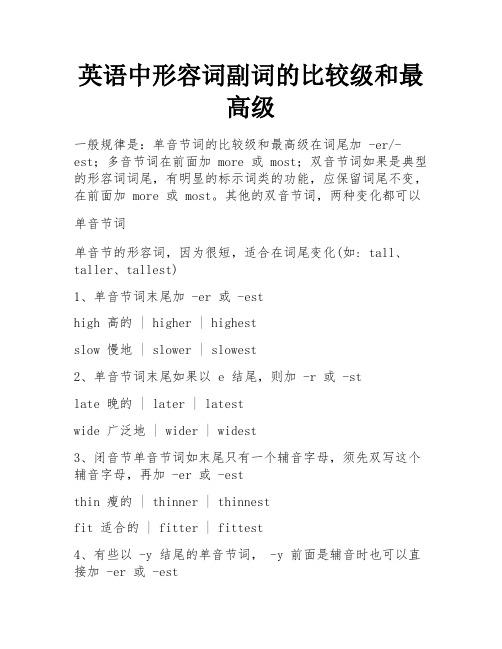
英语中形容词副词的比较级和最高级一般规律是:单音节词的比较级和最高级在词尾加 -er/-est;多音节词在前面加 more 或 most;双音节词如果是典型的形容词词尾,有明显的标示词类的功能,应保留词尾不变,在前面加 more 或 most。
其他的双音节词,两种变化都可以单音节词单音节的形容词,因为很短,适合在词尾变化(如: tall、taller、tallest)1、单音节词末尾加 -er 或 -esthigh 高的 | higher | highestslow 慢地 | slower | slowest2、单音节词末尾如果以 e 结尾,则加 -r 或 -stlate 晚的 | later | latestwide 广泛地 | wider | widest3、闭音节单音节词如末尾只有一个辅音字母,须先双写这个辅音字母,再加 -er 或 -estthin 瘦的 | thinner | thinnestfit 适合的 | fitter | fittest4、有些以 -y 结尾的单音节词, -y 前面是辅音时也可以直接加 -er 或 -estshy 害羞的 | shyer | shyestsly 狡猾的 | slyer | slyestwry 讽刺的 | wryer | wryest多音节词三个音节以上的多音节词已经很长,不适合再加词尾变化,因而在前面加 more 或 most,表示更(最)...,或者加 less 或least ,表示更(最)不...interesting 有趣的 | more interesting | most interestingimportant 重要的 | less important | least importantcarefully 认真地 | more carefully | most carefully双音节词双音节形容词很尴尬:不长不短,怎么判断?1、词尾是典型的形容词词尾,有明显的标示词类的功能,应保留词尾不变,在前面加 more 或 mostcrowded more crowded most crowdedloving more loving most lovinghelpful more helpful most helpfulfamous more famous most famousactive more active most active2、其他的双音节形容词,如果不是典型的形容词字尾,变化则无限制,两种变化都可以often oftener(more often) oftenest(most often)shallow shallower(more shallow) shallowest(most shallow)3、如果是 -y 结尾,这个长母音因为发音上的要求,要先变成短母音的 i,再加字尾变化,如:happy happier happiestlucky luckier luckiest二、不规则形式good/well | better | bestbad/ill/badly | worse | worstmany/much | more | mostlittle | less | leastfar | farther/further | farthest/furthestold | older/elder | oldest/eldest三、比较等级英语中形容词副词有三个比较等级,即原级、比较级和最高级1、原级(1) 表示程度相同,即“和...一样...”时用原级,常用"as... as" 结构It is as beautiful as paradise in Heaven. 这里如天堂般美丽This room is as broad as it is long. 那个房间长宽相等He is as handsome as John (is). 他和约翰一样英俊He studies as hard as John (does). 他和约翰一样努力(2) as...as... 引导的结构可采用倒装句型He studies as hard as John (does). = He studies as hard as does John.He is as handsome as John is. = He is as handsome as is John.(3) 否定的原级用 not as...as 或not so...as,二者区别不大You are not as tall as he. 你没有他高Guangzhou is not as clean as Shanghai. 广州没有上海那么干净I didn't do so well as I should. 我做得不如我应做得那么好(4) as/so... as... 结构前可以用 just、quite、almost、nearly、half 等词在程度上加以修饰This story was quite as interesting as we had thought. 这个故事和我们想的一样精彩The bike is not half so new as mine. 这辆自行车还没我的一半新She can read twice as fast as he does. 她的阅读速度比他快一倍John is not quite as good a student as his sister.连接词 as 表示这是组 as..as 的比较级。
形容词与副词的比较级与最高级形式
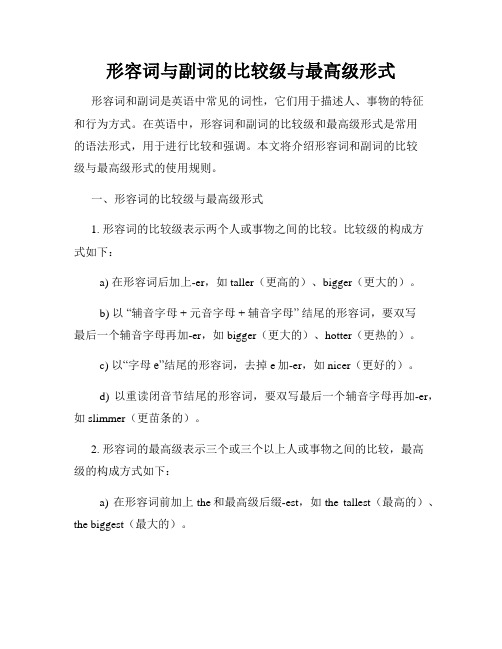
形容词与副词的比较级与最高级形式形容词和副词是英语中常见的词性,它们用于描述人、事物的特征和行为方式。
在英语中,形容词和副词的比较级和最高级形式是常用的语法形式,用于进行比较和强调。
本文将介绍形容词和副词的比较级与最高级形式的使用规则。
一、形容词的比较级与最高级形式1. 形容词的比较级表示两个人或事物之间的比较。
比较级的构成方式如下:a) 在形容词后加上-er,如taller(更高的)、bigger(更大的)。
b) 以“辅音字母 + 元音字母 + 辅音字母” 结尾的形容词,要双写最后一个辅音字母再加-er,如bigger(更大的)、hotter(更热的)。
c) 以“字母e”结尾的形容词,去掉e加-er,如nicer(更好的)。
d) 以重读闭音节结尾的形容词,要双写最后一个辅音字母再加-er,如slimmer(更苗条的)。
2. 形容词的最高级表示三个或三个以上人或事物之间的比较,最高级的构成方式如下:a) 在形容词前加上the和最高级后缀-est,如the tallest(最高的)、the biggest(最大的)。
b) 形容词以“辅音字母 + 元音字母 + 辅音字母” 结尾,要双写最后一个辅音字母再加-est,如the biggest(最大的)、the hottest(最热的)。
c) 形容词以“字母e”结尾,去掉e加-est,如the nicest(最好的)。
d) 以重读闭音节结尾的形容词,要双写最后一个辅音字母再加-est,如the slimmest(最苗条的)。
二、副词的比较级与最高级形式1. 副词的比较级与形容词的比较级形式相同,可以通过在副词后加上-er构成,如faster(更快地)、longer(更长地)。
2. 副词的最高级可以通过在副词前加上the和最高级后缀-est构成,如the fastest(最快地)、the longest(最长地)。
3. 以-y结尾的副词,把y变为i再加-er和-est,如happily(快乐地)的比较级为happier(更快乐地),最高级为the happiest(最快乐地)。
英语形容词和副词的比较级和最高级

英语形容词和副词的比较级和最高级英语形容词和副词的比较级和最高级是英语语法中的一个重要部分,它们用于表示事物之间的程度差异。
在英语中,形容词和副词有三种形式:原级、比较级和最高级。
1. 原级(Positive Degree):表示事物的正常状态或基本程度。
例如:happy(快乐的)、quickly(快速地)。
2. 比较级(Comparative Degree):表示两个事物之间的程度差异。
比较级的构成方式有两种:a) 在形容词和副词后面加-er。
例如:bigger(更大的)、faster(更快的)。
b) 对于以字母e结尾的形容词和副词,只需在后面加-r。
例如:nice(好的)→nicer(更好的)、large(大的)→larger (更大的)。
c) 对于以一个辅音字母加一个元音字母结尾的双音节形容词和副词,以及以重读闭音节结尾的多音节形容词和副词,需要在前面加more。
例如:beautiful(美丽的)→more beautiful (更美丽的)、carefully(小心地)→more carefully(更小心地)。
3. 最高级(Superlative Degree):表示三个或三个以上事物之间的程度差异。
最高级的形式分为两种:a) 在形容词和副词前面加the。
例如:the biggest(最大的)、the fastest(最快的)。
b) 对于不规则变化的形容词和副词,需要单独记忆其最高级形式。
例如:good(好的)→the best(最好的)、bad(坏的)→the worst(最坏的)。
在使用比较级和最高级时,需要注意以下几点:1. 当比较的对象是同一类事物时,可以使用比较级或最高级。
例如:My car is faster than yours.(我的车比你的车快。
)2. 当比较的对象不是同一类事物时,不能使用比较级或最高级。
例如:My car is faster than a bicycle.(我的车比自行车快。
形容词和副词的比较级和最高级(完美版)
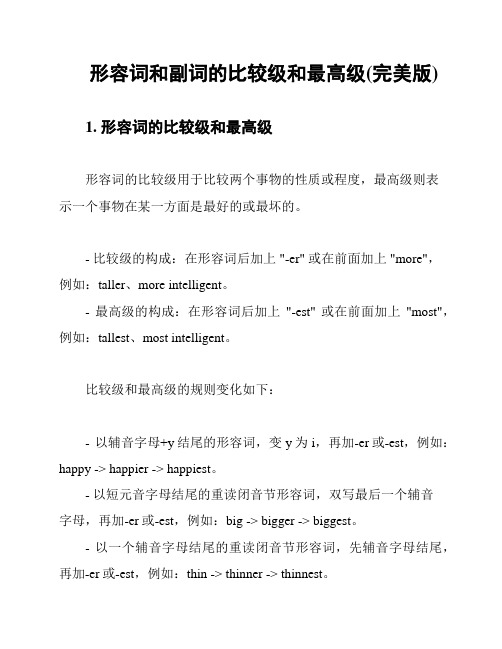
形容词和副词的比较级和最高级(完美版)1. 形容词的比较级和最高级形容词的比较级用于比较两个事物的性质或程度,最高级则表示一个事物在某一方面是最好的或最坏的。
- 比较级的构成:在形容词后加上 "-er" 或在前面加上 "more",例如:taller、more intelligent。
- 最高级的构成:在形容词后加上"-est" 或在前面加上"most",例如:tallest、most intelligent。
比较级和最高级的规则变化如下:- 以辅音字母+y结尾的形容词,变y为i,再加-er或-est,例如:happy -> happier -> happiest。
- 以短元音字母结尾的重读闭音节形容词,双写最后一个辅音字母,再加-er或-est,例如:big -> bigger -> biggest。
- 以一个辅音字母结尾的重读闭音节形容词,先辅音字母结尾,再加-er或-est,例如:thin -> thinner -> thinnest。
- 多音节和部分双音节形容词前加more或most,例如:beautiful -> more beautiful -> most beautiful。
2. 副词的比较级和最高级副词的比较级和最高级的构成方式与形容词类似,只是在形容词的基础上加上 "-ly" 构成副词。
- 比较级的构成:在副词后加上 "-er" 或在前面加上 "more",例如:faster、more quickly。
- 最高级的构成:在副词后加上 "-est" 或在前面加上 "most",例如:fastest、most quickly。
与形容词类似,副词的规则变化也遵循相同的规律。
中考英语与形容词、副词的比较级和最高级
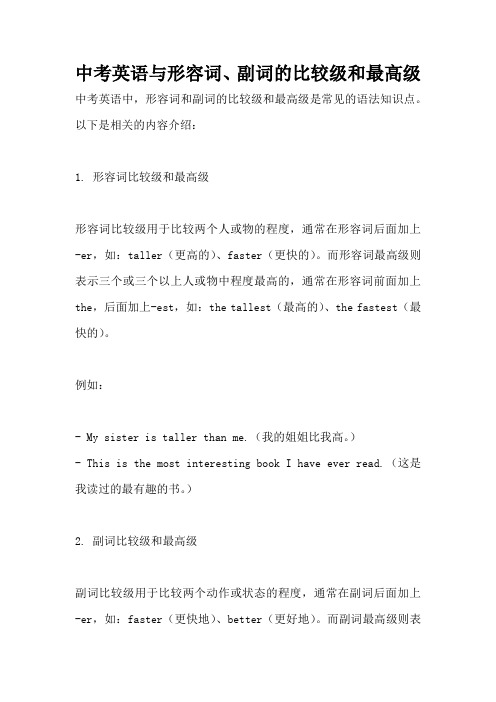
中考英语与形容词、副词的比较级和最高级中考英语中,形容词和副词的比较级和最高级是常见的语法知识点。
以下是相关的内容介绍:1. 形容词比较级和最高级形容词比较级用于比较两个人或物的程度,通常在形容词后面加上-er,如:taller(更高的)、faster(更快的)。
而形容词最高级则表示三个或三个以上人或物中程度最高的,通常在形容词前面加上the,后面加上-est,如:the tallest(最高的)、the fastest(最快的)。
例如:- My sister is taller than me.(我的姐姐比我高。
)- This is the most interesting book I have ever read.(这是我读过的最有趣的书。
)2. 副词比较级和最高级副词比较级用于比较两个动作或状态的程度,通常在副词后面加上-er,如:faster(更快地)、better(更好地)。
而副词最高级则表示三个或三个以上动作或状态中程度最高的,通常在副词前面加上the,后面加上-est,如:the fastest(最快地)、the best(最好地)。
例如:- She sings better than her sister.(她唱歌比她姐姐好。
)- He speaks English the most fluently in our class.(他在我们班上说英语说得最流利。
)需要注意的是,有些形容词和副词的比较级和最高级形式不规则,需要记忆。
例如:- good(好的)- better(更好的)- the best(最好的)- bad(坏的)- worse(更坏的)- the worst(最坏的)- well(好地)- better(更好地)- the best(最好地)- badly(坏地)- worse(更坏地)- the worst(最坏地)。
形容词副词的比较级和最高级变化规则
形容词副词的比较级和最高级变化规则形容词和副词的比较级和最高级变化规则如下:
1. 一般情况下,在形容词和副词的原级后加-er构成比较级,加-est构成最高级。
例如:
原级:fast(快速的)
比较级:faster(更快的)
最高级:fastest(最快的)
原级:happy(快乐的)
比较级:happier(更快乐的)
最高级:happiest(最快乐的)
2. 如果形容词或副词的原级以字母e结尾,直接在原级后加-r构成比较级,加-st构成最高级。
例如:
原级:nice(好的)
比较级:nicer(更好的)
最高级:nicest(最好的)
3. 如果形容词或副词的原级以辅音字母+y结尾,先将y变为i,再加-er构成比较级,加-est构成最高级。
例如:
原级:funny(有趣的)
比较级:funnier(更有趣的)
最高级:funniest(最有趣的)
4.一些形容词及副词的比较级和最高级形式不规则,需要进行记忆。
例如:
原级:good(好的)
比较级:better(更好的)
最高级:best(最好的)
原级:bad(坏的)
比较级:worse(更差的)
最高级:worst(最差的)
原级:far(远的)
比较级:farther(更远的)
最高级:farthest(最远的)
总的来说,形容词和副词的比较级和最高级的变化规则大致为在原级后添加-er和-est,但也有一些特殊情况需要记住。
形容词和副词的比较级和最高级
形容词和副词的比较级和最高级形容词和副词的比较级和最高级是英语语法中的重要部分,它们用于比较不同事物的程度、大小或质量。
正确使用比较级和最高级可以增强语言表达力,使描述更准确、生动。
本文将详细介绍形容词和副词的比较级和最高级的用法及其变化规则。
一、形容词的比较级和最高级1. 比较级的构成形容词的比较级一般在词尾加上"-er",同时双音节词或多音节词可以在前面加上"more"来表示比较级。
例如:bright - brighterclever - cleverer/more cleverbeautiful - more beautiful2. 最高级的构成形容词的最高级一般在词尾加上"-est",同时双音节词或多音节词可以在前面加上"most"来表示最高级。
例如:bright - brightestclever - cleverest/most cleverbeautiful - most beautiful3. 特殊变化规则部分形容词在比较级和最高级的变化时需注意特殊规则,如:good - better - bestbad - worse - worstfar - farther/further - farthest/furthest二、副词的比较级和最高级1. 比较级的构成副词的比较级一般在词尾加上"-er",同时双音节词或多音节词可以在前面加上"more"来表示比较级。
例如:quickly - quickercarefully - more carefully2. 最高级的构成副词的最高级一般在词尾加上"-est",同时双音节词或多音节词可以在前面加上"most"来表示最高级。
例如:quickly - quickestcarefully - most carefully3. 特殊变化规则部分副词在比较级和最高级的变化时需注意特殊规则,如:well - better - bestbadly - worse - worstfar - farther/further - farthest/furthest三、用法注意事项1. 比较级的用法比较级用于两个事物之间的比较,可以通过加入"than"来表达具体的比较对象。
形容词和副词比较级和最高级
形容词和副词比较级和最高级笔记本上有的,如果不清楚可以复印.一定要彻底搞明白形容词和副词比较级和最高级一、-er (比较级),- est (最高级)a)一般单音节单词, 直接加er, est .e.g. short, bright, young, strong, poorb)以e 结尾的,直接加r, ste.g. large, wide, latec)双写最后一个字母,加er, este.g. big, red, hotd)以y 结尾的,去y 变iere.g. easy, early, busy, happy, healthy二、more, most形式a)多数双音节,三音节以及三音节以上的形容词或副词,采用more+ 原级,most+原级e.g.careful, useful, difficult, interesting,b)-ed 结尾的形容词e.g.tired, worried三、不规则变化Many/much-- more-- mostbad/ badly/ ill -- worse-- worstfar -- farther -- farthestfar -- further -- furthestgood/ well -- better -- bestlittle -- less -- least四、形容词和副词比较级和最高级的常用结构1. as + 原级+ as: 。
与。
一样Their library is as big as yours.2.not as/ so + 原级+ as …不如。
Michael is not as/ so tall as Wood.3.比较级+ than 比。
(两者比较)This dress is nicer than that one.4.比较级连用Winter is coming. It is getting colder and colder.You are become more and more beautiful.5.the + 最高级: 三者或三者以上的最。
形容词和副词的比较级和最高级
形容词和副词的比较级和最高级形容词和副词的比较级和最高级重点: 1、了解形容词、副词比较级以及最高级的构成规则;2、了解形容词、副词比较等级的用法。
精讲部分一. 形容词和副词在使用时都有三个级别:原级、比较级、最高级。
例:(small smaller smallest) (tall taller tallest) (hard harder hardest) 比较级和最高级的构成有规则和不规则的变化两种1.规则变化单音节词和少数双音节词,在词尾加-er,-est来构成比较级和最高级。
多音节词,加more,most构成比较级和最高级2.二. 形容词和副词的比较级和最高级的用法1.as + 原级 + as 表示“与…… 一样”The painting is as beautiful as that one.这幅画和那幅画一样漂亮。
(形容词) He sings as well as his teacher. 他唱得和他的老师一样好。
(副词)注意:在否定句中可用 not as(so) + 原级 + as 与……不一样,不及…… 例: It is not as (so) cold in Shanghai as in Beijing in winter.冬天上海的天气没北京的天气冷。
(形容词)The girl doesn’t run as quickly as the boy. ;女孩跑得不如男孩快。
(副词)2.比较级 + than 表示“ … 比… 更…”This hotel is cheaper than that one across the street.这家宾馆比街对面那家更便宜。
(形容词)It is quicker to take a underground than to take a bus.坐地铁比坐公交车快。
(形容词)Mary writes more carefully than Tom. Mary 写得比Tom 更认真。
- 1、下载文档前请自行甄别文档内容的完整性,平台不提供额外的编辑、内容补充、找答案等附加服务。
- 2、"仅部分预览"的文档,不可在线预览部分如存在完整性等问题,可反馈申请退款(可完整预览的文档不适用该条件!)。
- 3、如文档侵犯您的权益,请联系客服反馈,我们会尽快为您处理(人工客服工作时间:9:00-18:30)。
一. 教学内容:专题:形容词、副词的比较级和最高级三. 具体内容:(一)形容词、副词比较级和最高级的构成:1. 单音节词和少数双音节词比较级和最高级的规则变化:beautiful—more beautiful—(the) most beautiful3. 由形容词加ly构成的双音节词和多音节词,都是在该词前加-more/most.quickly—more quickly—(the) most quicklydifficultly—more difficultly—(the) most difficultly4. 不规则变化:(二)形容词比较级和最高级的用法:1. 原级的用法:用于两者之间对比,意思为“……和……相同”A+v.+as….+形容词原级+as BTom is as honest as Jack.Her skin is as white as snow.My dog is as old as that one.He is not as (=so) tall as I.The weather here is not as(=so)cool as the weather in Harbin.2. 比较级的用法:1)A+形容词比较级+than+ BSusan is happier than Jane.His brother is younger than me.Beijing is more beautiful than Osaka.形容词比较级前还可以用much, even, still, a little,far, a lot, a bit, much more来修饰。
Very, so, too, quite 不能修饰比较级。
2)数字+形容词比较级+thanI’m two years older than you.She is a head taller than me.3)比较级+and+比较级,表示“越来越……”The earth is getting warmer and warmer.China becomes more and more stronger.4)the +比较级,the +比较级结构,表示“越……就越……”The more I study it, the more I like it.5)which/who +is +比较级Which city is bigger, Beijing or Tianjin?Who is happier, you or me?3. 最高级用法:用于三者及以上的人或事物的比较,最高级前加the,最高级前有物主代词,序数词和名词所有格时,不加定冠词,后面跟带in或of表范围的短语。
1)one of the +最高级Shanghai is one of the most beautiful cities in China.Our city is one of the safest cities in the world.Most people like apples.Most of the boys are good.It is our nearest neighbor in space.2)最高级意义的表达方法:(三)副词比较级和最高级的用法:1. 原级主要的句型:1)as+副词原级+asTom runs as fast as Jones.not as/so+副词原级+asH e didn’t come as/so early as Li Lei.2)too+副词原级+to do sth.Jean rides too slowly to catch up with me.3)so +副词原级+ thatJean rides so slowly that she can’t catch up with me.4)副词原级+enough to do sth.Jean doesn’t ride fast enough to catch up with me.2. 比较级的用法:1)比较级+than。
当前后使用的动词相同时,通常用助动词来代替后面的动词,该动词或助动词可以省略。
Lily run faster than Mary(did).2)比较级+and +比较级The days are getting longer and longer in summer.3)the more…the more…The harder you work, the better you will learn.3. 最高级的用法:副词最高级前一般有the,也可省略。
He works (the) hardest of all the students in the class.词副词比较级最高级专题训练一一.单选1. The air in Beijing is getting much now than a few years ago.A. cleanB. cleanerC. cleanestD. the cleanest2. —is your grandpa, Emma?—He’s wa tering the flowers in the garden.A. WhenB. WhatC. WhereD. How3. Nowadays science fiction isn’t as as cartoons among teenagers.A. popularB. more popularC. less popularD. the most popular4. We are glad to see that Shanghai is developing these years than ever before.A. quicklyB. less quicklyC. more quicklyD. the most quickly5. The cheese cake tasted so that the kids asked for more.A. deliciousB. wellC. badD. badly6. She looks very . I think she needs to have a rest.A. tiredB. hardC. wellD. hardly7. —do you play computer games?—Once a week.A. How soonB. How oftenC. How longD. How many8. The population of Tianjin is than that of Shanghai.A. largerB. lessC. smallerD. fewer9. It’s raining . We have to stay at home instead of going fishing.A. badlyB. hardlyC. heavilyD. strongly10. —Can you give a hand with this table? I want to move it.—Sure. are you going to put it?A. WhyB. HowC. WhereD. When11. Guo Yue did quite at the World Table Tennis Championship, but Zhang Yining did even .A. better, wellB. well, wellC. well, betterD. better, better12. —Tom is six and he is his sister Jane. How old is Jane?—Three.A. twice as old asB. two years older thanC. three years younger thanD. as old as13. —Remember, boys and girls. you work, result you will get.—We know, Miss Gao.A. The better, the harderB. The harder, the betterC. The hard, the betterD. The harder, the good14. Jack has three friends. Mike is the of the four.A. most cleverestB. more cleverC. cleverestD. clever15. —In our English study reading is more important than speaking. I think. —I don’t agree, speaking is than reading.A. as important asB. so important asC. the most importantD. the same as形容词副词比较级最高级专题训练二I. 用Of, than, in, as填空。
1. This table is as big that one.2. The yellow book is bigger the blue one.3. Tom is the best student the class.4. This lesson is more interesting that one.5. This apple is the largest all the apples.II. 单选。
1. John is my friend of all the classmates.A. goodB. betterC. bestD. the best2. E-mailing is much than long-distance calling.A. cheapB. cheaperC. cheapestD. the cheapest3. Beijing is one of cities in China.A. very beautifulB. much beautifulC. more beautifulD. the most beautiful4. The Yellow River isn’t so as the Changjiang River.A. longB. longestC. longerD. the longest5. The coat I bought last week is too big for me. I’d like to change it for a one.A. smallB. largerC. nicerD. smaller6. Who is the , Jim, Li Lei or Ling Feng?A. tallB. tallerC. tallestD. much taller7. Of all the students, Wu Dong runs .A. fastB. fasterC. fastestD. most fast8. He has grown to take care of himself.A. tall enoughB. enough tallC. old enoughD. enough old9. Tom draws better than his brother.A. moreB. mostC. manyD. much10. Who does homework in your class?A. carefullyB. most carefullyC. more carefullyD. as carefully as形容词--形容词的比较级和最高级(1)形容词的比较级和最高级(1)1. 在英语中,在表示“比较…”和“最…”时,形容词要用特别的形式,称为“比较级”和“最高级”,原来的形容词称为“原级”:原级比较级最高级strong强 stronger较强 strongest最强2. 形容词的比较级和最高级的构成方法如下:a. 单音节词和少数双音节词以加-er和-est的方式构成:原级比较级最高级young年轻 younger较年轻 youngest最年轻old老 older较老 oldest最老clean干净 cleaner较干净 cleanest最干净在加词尾时要注意下面的各种情况:b. 其他词都在前面加more, most构成比较级及最高级:原级比较级最高级important more important most importantdifficult more difficult most difficultinteresting more interesting most interestinguseful more useful most useful 3. 用比较级时常用than引起一个从句,表示和什么比较:His room is bigger than mine. 他的房间比我的房间大。
